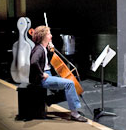The Rest is Noise: Listening to the Twentieth Century, by Alex Ross
 Editor's Abstract
Editor's Abstract
Since I do lot of teaching I read a lot of books. Not all of them are music-related, but a high proportion of them are. From time to time in this space I’ll be posting reviews of books I’ve read, with the hope that 1) you’ll be able to sort through books more quickly (as to whether you really want to spend the time reading them) and 2) you’ll read something that you might not have otherwise considered. Enjoy!
Yvonne Caruthers
Alex Ross is well-known as the music critic of The New Yorker magazine. This is his first book, and as captivating as it is, one hopes that many others will follow.
The book opens with a description of the premiere of Richard Strauss’s opera, Salome. Mahler attended the premiere, as did Schoenberg, and it’s even possible that Hitler sat in the audience as well – though Ross says this can’t be verified. Ross uses anecdotes like this throughout the book to give the reader a sense not only of place and time, but personalities and trends.
The “survey of music history” course I took in college was so boring that everyone in the class used the textbook to cure insomnia. What a shame. There was certainly nothing in that course to suggest that one day I’d read new books on music history so avidly, but I now find it to be one of the most interesting fields of study and very important to me in my dual roles of performer and teacher. Mr. Ross would make a first-class professor, and I’m sure this book will inspire professional and amateur musicians and music lovers to continue exploring this rich field.
Not only is Mr. Ross a gifted writer of lucid prose, as his years at The New Yorker have proven, he’s a first-class researcher. He’s dug up fascinating anecdotes about nearly every composer that he mentions, and he even touches upon such things as the CIA-funded festivals after WWII that included ultra-avant-garde works – who knew?? (I’m dying to learn more about Nicolas Nabokov, cousin of famed novelist Vladimir Nabokov – a composer who seems to have been on the payroll of the CIA for at least a short while and whose name turns up not only in association with Stravinsky, Prokofiev, and Shostakovich, but also with Schoenberg, Boulez, and Bernstein!).
Some composers are given more attention than others: Britten’s operas are analyzed in detail, Samuel Barber is only mentioned in passing, but that’s a small quibble with a book which is encyclopedic in nature. It might also be argued that we don’t yet know the place in history of works from the year 2000 (such as music by Thomas Adès), but the subtitle of the book promises us “the 20th century,” and Ross is quite literal about that.
The best aspect of reading this book (which loses none of its impact even when read only a few pages at a time) is that you gain a real sense of trends and the influences behind them, as Mr. Ross carefully relates composers to their times, and to each other, through teacher-student relationships, festivals and performances attended, letters exchanged, and prizes won. It’s a fascinating tapestry and I highly recommend this book.

Leave a Comment: